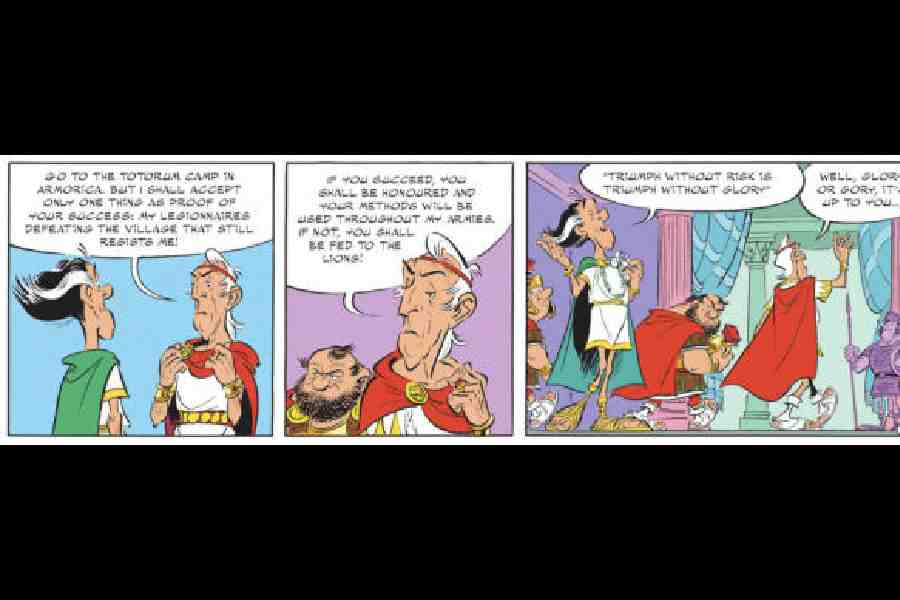Ian Fleming discovered early on with James Bond that invented heroes could easily steal the spotlight. In the case of Albert Uderzo and Rene Goscinny that’s a good thing because their beloved creation — Asterix if you are wondering — continues to shine like a diamond. Of course, the cut of diamonds varies vastly and, sorry to be blunt, fake gems too hold our appeal. All these words hopefully tie in with what Asterix and the White Iris, the 40th album in the series, has to offer. The creators have long waved goodbye — Goscinny turning in his final words in 1977 while Uderzo ran out of ink in 2020 — yet the creation has been kept alive by Didier Conrad, who has illustrated the sixth book in the series while Fabcaro replaces Jean-Yves Ferri in the writing department.
The small village of indomitable Gauls this time goes soft and mushy, like peas. Well, it’s all part of a plan to bring them down, funded by Julius Caesar of course. It’s still 50BC, it’s still the case of Caesar’s legions taking a hammering and it’s still the same colourful set of characters but there is a breath of fresh air — sorry to be a killjoy Unhygienix — in the form of a new writer, bringing in new ideas. The latest album is one of the best since Goscinny’s death.
A reflection of life
France has obviously changed a great deal since Asterix the Gaul arrived in 1961, one being Nicolas Sarkozy’s Caesar-style nose being replaced by Emmanuel Macron’s petit nez but Asterix remains a matter of French national pride, holding a mirror to what’s happening around us. It explains the introduction of plant-based cuisine and a climate in which most are trying to be politically correct.

Julius Caesar allows Isivertuus to divide the little Gaulish village with the White Iris philosophy
The villain in the piece is Isivertuus, who has been working on a “method” for several years, called White Iris because “inside every one of us there’s a flower waiting for a little goodwill to help it bloom”. You get the drift, right?! His method is inspired by the Athenian philosopher Duazuplees. All he has to do is make Unhygienix believe that his fish are “brimming with essential nutrients” and play Impedimenta, the wife of village chief Vitalstatistix, to imagine living in beautiful Lutetia, complete with the writer’s nod to the film Casablanca: “Whatever life throws at us, we’ll always have Lutetia”.
He succeeds to the point of the village folks accepting Cacofonix’s voice with charitable comments: “You’ve got to admire his commitment”, “I’m all about freedom of expression” and “Very striking.” By Toutatis, has life really turned a corner for the merry men?
Political correctness can be a phantom enemy, wrote Moira Weigel a few years ago. By the time Donald Trump was fighting to become the US president in 2016, political correctness was heavy in the air, to the point that the man could use it to his advantage. In a way he said that the Obama era taught people to put political correctness above common sense. And that he is all about common sense. In the new Asterix album Isivertuus, a master in the art of trickery and deception, first sows the seeds of political correctness and then tries to drive the sledgehammer.
Mindfulness guru on mission impossible
One is reminded of Preposterus (Obelix and Co) — a parody of French politician Jacques Chirac — and Prolix, the soothsayer with the famous words “when the storm is over, the weather will improve” (Asterix and the Soothsayer) while reading about Isivertuus. He has a way with words: “Gather what lies before you and reap the benefits”, “You smell so good I could burst into song” and “A moment’s happiness erases a hundred sorrows”. A true mindfulness guru in the mould of Adam Neumann, the co-founder of the now bankrupt WeWork. Remember what the billionaire said? “I try to surround myself with people smarter than me — if I’m the smartest guy in the room, I change rooms.”

Asterix and Obelix quickly understand the mischievous plan Isivertuus hatches
You may say being hapless is part of the plot because like the French, the Gallic villagers “devote” time to arguing and eating but when threatened, unity becomes the buzzword, best enjoyed with a swig of magic potion. But Isivertuus is one of the toughest opponents Asterix and Obelix have taken on. And that says a lot about the latest album.
Many Asterix “experts” have spoken about how Goscinny’s death rationed the liberal sprinkling of wit but Uderzo tried his best to keep the fire burning. Didier Conrad has done a fantastic job in the illustration department in the six albums he has been associated with but Fabcaro brings back the flow of wit.
There is even a few hilarious pages highlighting two-wheel scooters that kids use, of course these are “mini-chariots” in Lutetia. There is also the artist Banksix (hat tip to Banksy) and a play on a Shakespearean note — Cubitum For Cubitum.
The secret of the series’ success remains unchanged — it’s a world you know well and would like to visit. It has its share of heroes, jokes and feasts. And fans young and old can never tire of seeing Romans being given a share of pow-wow grief. The book is full of simple pleasures for loyal fans and new recruits. Asterix and the White Iris is what the weather recommends, especially potent when combined with a Moka pot-brewed coffee. How can you go wrong with an Asterix album where we learn that Vitalstatistix’s nickname Piggywiggy marches well with Impedimenta’s Pediped? By Toutatis, this is unadulterated fun.











